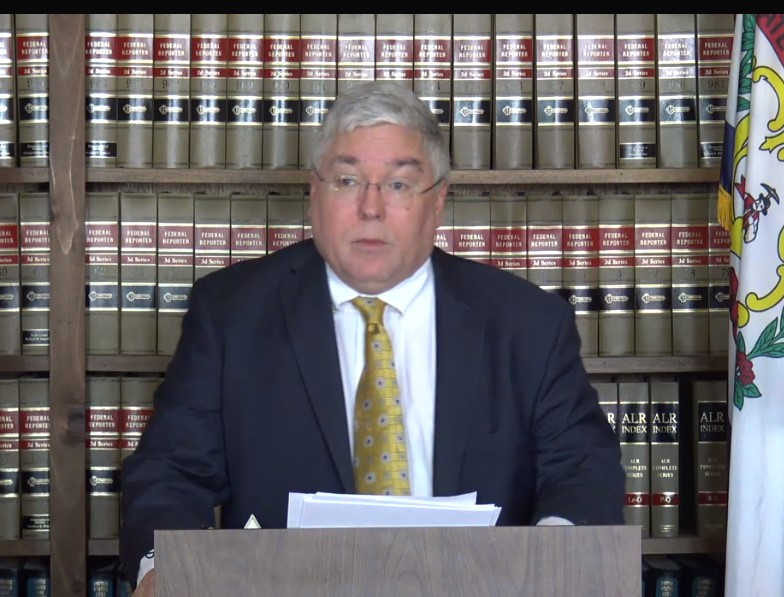CHARLESTON, W.Va. — A circuit judge is prepared to dismiss a consumer protection case filed by Attorney General Patrick Morrisey against the Diocese of Wheeling-Charleston, but has halted the case for now to ask two big questions of the state Supreme Court.
Wood Circuit Judge J.D. Beane submitted certified questions and an accompanying order on Wednesday.
The judge is poised to conclude that regulating programs the diocese offers to the public under the consumer protection act goes too far to entwine the state with organized religion.
Beane asks how state officials, both as a practical and constitutional matter, could oversee how the church represents itself when it markets programs such as school enrollment or summer camp.
The lawsuit by the Attorney General’s Office blames the diocese for failing to protect children from sexual abusers.
More specifically, the lawsuit contends that when the diocese promotes educational and recreational services to the public, it is subject to the consumer protection act and should disclose the details of prior sexual abuse incidents.
About this time last year, the diocese announced it would release the names of all priests and deacons credibly accused of child abuse since 1950. The diocese then released the list last May.
Then, in April, lawyers for the diocese moved to dismiss the consumer protection lawsuit. Morrisey’s office argued against dismissal.
Judge Beane has concluded the case should be dismissed but not until the Supreme Court has a chance to consider two overriding questions.
Morrisey, in a statement, praised staying the case until then.
“The court’s decision to stay our case recognizes the complexity and uncharted territory of this litigation, as well as the importance of guidance from our Supreme Court in this matter of statewide interest,” Morrisey stated.
Beane is first asking the Supreme Court whether the Consumer Credit and Protection Act should apply to religious institutions in connection with the sale or advertisements or educational or recreational services.
The judge’s own conclusion is no.
He is also asking whether the full effect of the state applying the consumer protection act to the church would “constitute an excessive entanglement of church and state” prohibited by the constitutions of the United States and West Virginia.
His answer is yes.
“When the cumulative effect of the entire Church-State relationship arising under the Consumer Credit and Protection Act is revealed it becomes clear that the constitutional prohibition against excessive Church-State entanglement is violated,” Beane wrote.
The 40-page ruling explores the practical and constitutional effects of how the state could oversee how the church markets itself to the public.
Beane concluded that, as a practical matter, the Attorney General’s position would mean continuously monitoring and supervising Diocese communications for an indefinite time.
Moreover, the judge suggested, under that scenario the Attorney General would have the authority to determine what ‘full background checks and training requires,’ as well as the power to decide what would constitute fulfilling promises made under the church’s “Safe Environment Program.”
An alternative would mean the diocese ceasing any advertising.
Later, the judge asked additional practical questions about how the consumer protection act might similarly be applied to other entities.
For example, would hospitals need to disclose in their advertisements whether any current or former employee had been conficted of domestic violence or a sexual offense?
Would advertisements for physicians have a duty to disclose negative results, credible accusations or the results of malpractice claims?
And what role would the Attorney General play in those matters?
“The list is inexhaustible; the powers of the Attorney General almost boundless and effectively would grant his office profound influence over every aspect of the state’s economy,” Beane wrote.
“It is inconceivable that this was the Legislature’s intent in enacting the Consumer Credit and Protection Act.”
Morrisey, in the statement distributed by his office, contends it is inconceivable that the diocese wouldn’t have to disclose credible accusations against priests when promoting its schools and other offerings to the public.
“The First Amendment appropriately provides significant protections for churches; at the same time, it’s hard to fathom how the church can literally be above the law and immune to any review of its deceptive advertising practices,” Morrisey stated.

